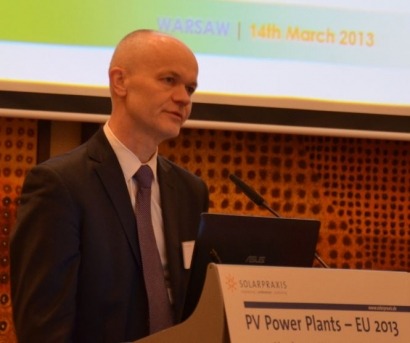
The event took place in Warsaw, Poland on the 14th and 15th March. An investment workshop on ”Photovoltaics in Poland” took place the day before the conference.
Around 180 experts took the opportunity to discuss the potential of the European photovoltaics industry, with particular regard to Poland. The central questions were whether, and to what extent, a PV market will emerge in Poland, and who should invest in it. Furthermore, the important topics of the solar industry such as on-site consumption, quality management and energy storage, were discussed.
The Polish market debate centred around the question of when the projected Renewable Energies Act is expected to come into force. During the opening session, ”Going East? The Future of PV in Europe”, predictions were varied, ranging from “maybe tomorrow” to “hopefully in 2014”.
According to Dr. Christian Schnell, a partner at DMS Legal law firm, the Renewable Energies Act should come into force in the first half of 2014, provided the proposal is submitted for debate in the Polish parliament before the summer break. An essential question was whether or not the co-combustion of biomass and coal will be part of the system. It now looks as if there will soon be a compromise to further modify the draft law so that it can be passed by the cabinet.
Adam de Sola Pool of Environmental Investment Partners encouraged participants to invest in the Polish market: “There will be a market for photovoltaics in Poland.” He advised his audience to remain flexible and be prepared to react quickly. Karol Lasocki of K&L Gates outlined the grid access situation for PV installations in Poland. He explained that in contrast to Germany’s current draft laws, there are few incentives for storing energy in the new Polish draft of the Renewable Energies Act.
Grzegorz Wisniewski of IEO - Institute Energetyki Odnawialnej said that it may even be worth investing in photovoltaic installations in Poland without subsidies because of the expected rise in electricity prices, amongst other reasons.
The PV industry’s potential beyond subsidies was also discussed in sessions on other European photovoltaic markets. Christian Grundner of Eclareon presented Turkey as a promising market for industrial roof installations that produce power for on-site consumption.
According to Pere Soria of Circutor, Spain is in a good position to use solar energy for on-site consumption without state subsidies thanks to excellent local conditions. Josefin Berg of IHS presented attractive conditions in other Eastern European markets, such as Romania, Serbia and the Ukraine. She did, however, recommend carrying out careful analysis since these markets present both opportunities and risks.
In addition to the growing PV markets, the conference also dealt with the latest technical issues. Ingo Ernst of Schneider Electric outlined the key strategies in the field of energy storage, such as peek shaving, load shifting, energy balancing and cost reduction, while Ken Christensen from SMA spoke about grid management.
The two-tiered PV Power Plants – EU 2013 Conference was organised by Solarpraxis AG, one of the leading knowledge service providers of the renewable energies sector and organiser of around twenty conferences and expert workshops per year.
For additional information:

